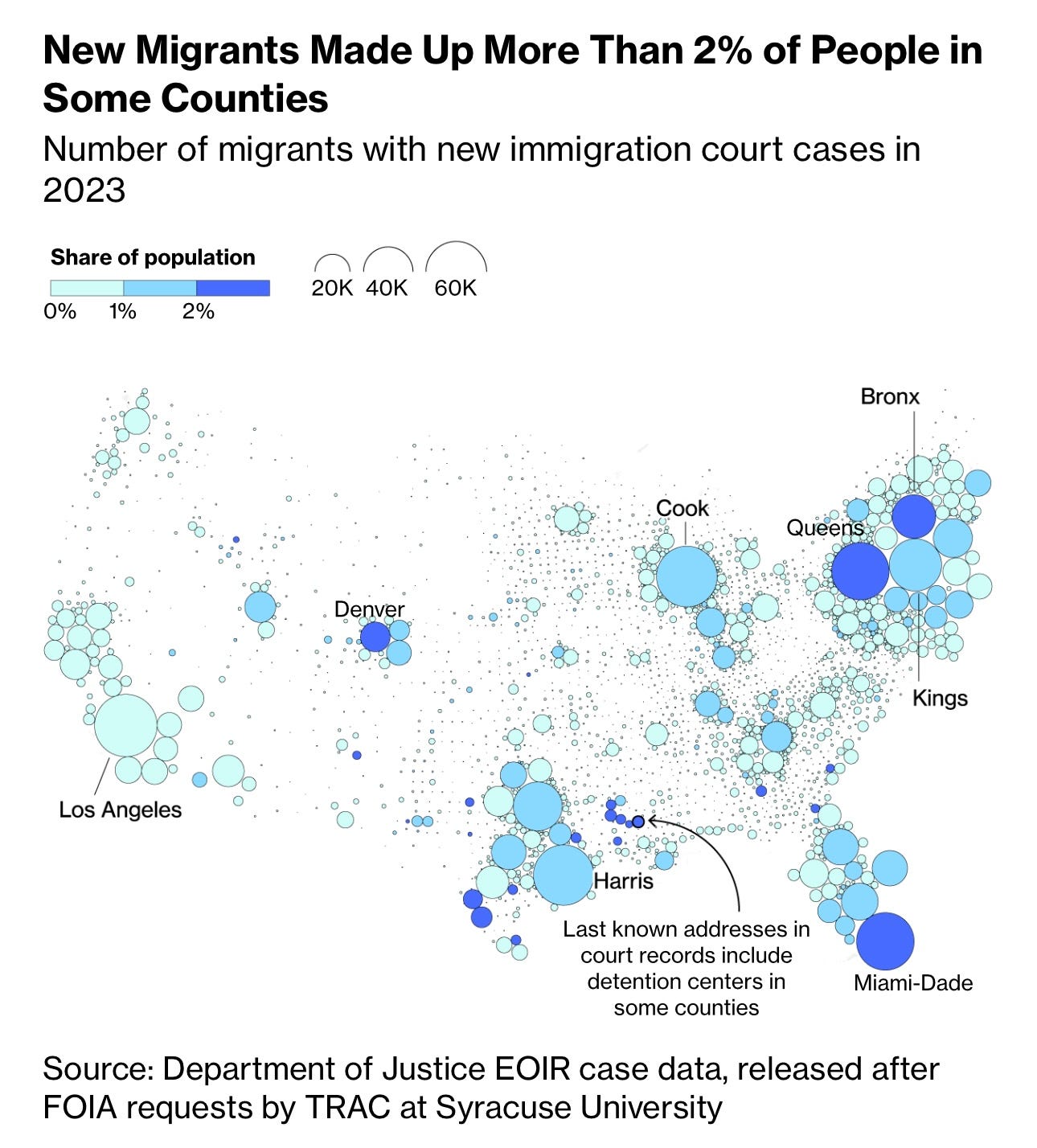1-Worldwide fertility rates dropping faster than expected: new report
2-Americans Say They Need $1.5 Million to Retire
3-Biden and Xi hold call
4-Immigration likely to decide 2024 election
5-Fentanyl tops climate change, abortion, foreign wars as key issue in 2024 election
4/4/1975-Microsoft founded
see ad astra on x @greg_loving
1-Worldwide fertility rates dropping faster than expected: new report
Two point one: That’s how many children everyone able to give birth must have to keep the human population from beginning to fall. Demographers have long expected the world will dip below this magic number—known as the replacement level—in the coming decades. A new study published last month in The Lancet, however, puts the tipping point startlingly near: as soon as 2030. It’s no surprise that fertility is dropping in many countries, which demographers attribute to factors such as higher education levels among people who give birth, rising incomes, and expanded access to contraceptives. The United States is at 1.6 instead of the requisite 2.1, for example, and China and Taiwan are hovering at about 1.2 and one, respectively. But other predictions have estimated more time before the human population reaches the critical juncture. The United Nations Population Division, in a 2022 report, put this tipping point at 2056, and earlier this year, the Wittgenstein Centre for Demography and Global Human Capital, a multidisciplinary research organization dedicated to studying population dynamics, forecasted 2040. Christopher Murray, co-author of the new study and director of the University of Washington’s Institute for Health Metrics and Evaluation (IHME), suspects his study’s forecast is conservative. “With each passing year … it’s becoming clearer that fertility is dropping faster than we expect,” he says. Because the 2030 figure is already a hastening of IHME’s previous estimate of 2034, “I would not be surprised at all if things unfold at an even faster rate,” he says.
2-Americans Say They Need $1.5 Million to Retire
Retirement is becoming an even more distant goal as higher costs cut into American budgets. A typical person now believes they need $1.5 million to retire comfortably, which is nearly 17 times more than the $88,400 savers have set aside on average, a Northwestern Mutual study shows. The gap, up 16% from last year, highlights the challenges coming into focus as the over-65 population in the US increases and Americans face the prospect of financing longer life spans and potential cuts to Social Security benefits. “People’s ‘magic number’ is now 50% higher than it was during the pandemic,” said Aditi Javeri Gokhale, chief strategy officer at Northwestern Mutual. “Soaring costs are putting more pressure on consumers to plan and be disciplined savers, and everyone knows they will need more money as they live longer.”
Breaking out the size of current retirement accounts by generation reveals the daunting obstacles for savers of all ages. The average amounts saved were $22,800 for Gen Z, $62,600 for millennials, $108,600 for Gen X and $120,300 for boomers.
3-Biden and Xi hold call
A call was expected but the date had not been announced in advance. Reading the respective readouts you might be excused for thinking that the two leaders were on different calls. The PRC readout, as usual, is much longer, and a bit more declarative. It states Xi “noted…the China-U.S. relationship is beginning to stabilize, and this is welcomed by both societies and the international community. On the other hand, the negative factors of the relationship have also been growing, and this requires attention from both sides.” Interestingly the Chinese readout lumps Taiwan and “trade and technology suppression measures” in the same paragraph, likely a signal that after Taiwan these measures are the issues of most concern to Xi and his team. From the PRC readout: “Xi Jinping stressed that the Taiwan issue is the first insurmountable red line in China-U.S. relations. We will not sit idly by in the face of separatist activities by "Taiwan independence" forces and external indulgence and support. We hope the U.S. side will implement President Biden's positive stance of not supporting "Taiwan independence" into actions. The U.S. has continuously imposed trade and technology suppression measures against China, and the list of sanctioned Chinese companies is growing longer. This is not "de-risking" but creating risks. If the U.S. side is willing to carry out mutually beneficial cooperation and share the dividends of China's development, China's door is always open; if the U.S. side insists on suppressing China's high-tech development and depriving China of its legitimate right to development, we will not stand by. The tech controls especially must be causing some real discomfort, and I think the PRC side is rightfully concerned about further possible restrictions on the tech exports. The US readout said Biden “raised concerns over the PRC’s support for Russia’s defense industrial base”, language other officials have used in their readouts with PRC counterparts, and a clear sign of the growing concern that while not providing weapons directly to Russia the PRC is playing a key role in keeping Russia’s defense industrial base operating.
Sinocism
4-Immigration likely to decide 2024 election
Immigration has erupted into a defining issue of the 2024 ballot, with a Bloomberg News/Morning Consult poll finding it second only to the economy as voters’ top concern. Courts are bogged down by unprecedented levels of cases—federal agents encountered 10,000 people a day crossing the southern border in December—and the tumult has exposed the US system as underfunded, opaque and bursting at the seams. “This is gonna decide who becomes the president, how it’s handled,” Nevarez said.
President Joe Biden has been put on the defensive, claiming his hands are tied without action from Congress to change laws. But it wasn’t Trump who most effectively boxed in Biden over migrants in the first place. It was a fellow Republican, Texas Governor Greg Abbott.
In early 2022, with migration rebounding as pandemic restrictions faded, Abbott heard from Texas mayors, county judges and police chiefs about communities overrun with migrants dropped off by the Border Patrol.“They said they could not handle it anymore,” Abbott said in an interview. “I said I would help them out.” So Abbott and his aides came up with a plan—which critics called politically motivated—to bus migrants to Democratic “sanctuary cities.” The first bus dropped migrants from Colombia, Cuba, Venezuela and Nicaragua near the Capitol. After that, others went to New York, Chicago, Philadelphia, Denver and Los Angeles. Other border hawks, including the governors of Florida and Arizona, followed suit with similar moves. As of early March, Texas had bused out more than 105,000 people. “Every state is now a border state, every town is now a border town,” Trump said Tuesday during a campaign speech in Michigan. Leaving the migrants—many poor, unauthorized to work and unprepared for cold winters—on Democrats’ doorsteps all of a sudden made it their problem to fix. City officials from New York and Chicago begged the Biden administration for help. With little aid forthcoming, even Democratic-led cities such as Denver ultimately paid to bus migrants to other destinations.
Immigration has exploded globally due to a confluence of factors, including the pandemic’s economic fallout and political turmoil in countries such as Venezuela and Ecuador. The arrivals to the US once came overwhelmingly from Mexico and Central America, but now hail from all over the world. Analysts say the numbers have been boosted by a belief that it’s now fairly easy to get across the US border and secure papers to start a tenuous new life while awaiting immigration court proceedings.
5-Fentanyl tops climate change, abortion, foreign wars as key issue in 2024 election
To understand the 2024 US presidential election, it is essential to understand the politics of fentanyl. Americans have been traumatized by a years-long wave of overdose deaths caused by the synthetic opioid. Once rarely used outside hospitals, fentanyl has become a ubiquitous street drug made by criminal gangs, often in Mexico, from cheap chemicals typically manufactured in China. It frequently is a hidden ingredient in other illicit drugs and can have fatal consequences for unsuspecting users.
About 8 in 10 voters in seven swing states say fentanyl misuse is a “very important” or “somewhat important” issue when deciding who to vote for in November — more than the number who cite abortion, climate change, labor and unions, or the wars in Ukraine and Gaza, according to a recent Bloomberg News/Morning Consult poll of almost 5,000 registered voters. Fentanyl has come up repeatedly in a campaign unfolding after an especially deadly phase in the US opioid epidemic. From just before the start of the Covid-19 pandemic in November 2019 to October 2023, about 270,000 people died of an overdose from a synthetic opioid, according to the most recent provisional data from the Centers for Disease Control and Prevention. Those fatalities account for the vast majority of overall opioid overdose deaths, which have climbed to about 80,000 a year.
4/4/1975-Microsoft founded
Thanks for reading!







